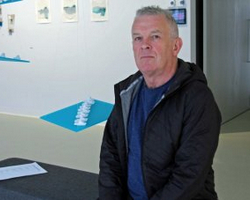 |
| Professor Philip Boyd is looking at alternative interventions to manage climate change. (936 ABC Hobart: Danica Scolyer) |
Professor Philip Boyd at the University of Tasmania's Institute for Marine and Antarctic Studies (IMAS) said scientists must look at all sorts of potential ways of cooling the planet.
"That's what people are beginning to talk about given the lack of momentum [on preventing climate change]," he told Helen Shield on 936 ABC Hobart.
"Things are still changing at a very rapid rate, things are melting at a rapid rate ... it really is something we need to concentrate our minds on, some alternatives — whether we use them or not."
Fertilising the oceans to fix anaemic plankton
One option Professor Boyd has been looking into is adding iron to the ocean to counteract low levels in phytoplankton.
A higher level of iron in plankton increases their growth which could be advantageous as plankton have been shown to absorb and store carbon dioxide, taking it out of the atmosphere.
 |
| Should we add iron to the oceans to help anaemic plankton? (CNRS/Tara Expitions: Christian Sardet) |
"Dust has a lot of iron in it so it actually got rid of the anaemia problem for these plankton," he said.
"[In the past] plankton [stored] more carbon and that sort of scrubbed more carbon out of the atmosphere.
"Should we fertilise the ocean, should we nourish it, should we play with it?"We've done that with the land for thousands of years, why not the oceans?"
Each change has an effect
Other options to counteract warming being explored include ways of reflecting sunlight back into space.
"So people have discussed can we make the clouds brighter? Should we paint the deserts white," Professor Boyd said.
"Even should we have these giant umbrellas in space that we can open up like a shutter and reflect more sunshine back?"
 |
| Could we create brighter clouds to reflect sunlight back into space, helping to cool the planet? (NASA: @astro_reid) |
"The Earth is pretty much all wired up together," he said.
"The oceans, the atmosphere, the land are all interconnected.
"If you tinker with one thing it'll probably come back and bite you, so you really need to know where these connections are."Professor Boyd said, for example, they know that a large volcanic eruption in the Philippines cooled the climate but caused a drought in India.
"If we got some of these things wrong it could have a more detrimental effect than beneficial," he said.
"It's something we have to look at.
"We do know that what often seem like very simple and very commonsense solutions at the time can come back and have unexpected consequences."
Links
- Antarctic cloud monitoring could help improve our weather forecasts
- Extending sanctuary zones on Ningaloo reef will help defend it: study
- Q&A showdown: Brian Cox takes on Malcolm Roberts
- Grower urges farmers to control climate change response
- Community energy projects taking off as Climate Council urges renewables push
- World's first climate refugees scramble to find new home

No comments:
Post a Comment